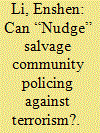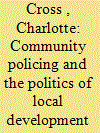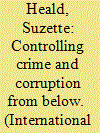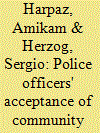|
|
|
Sort Order |
|
|
|
Items / Page
|
|
|
|
|
|
|
| Srl | Item |
| 1 |
ID:
190907


|
|
|
|
|
| Summary/Abstract |
Since the mid-2000s, the fear of “homegrown” terrorism in most developed democracies has prodded police to partner with local Muslim communities as a proactive and preventive approach to Islamic extremism. However, despite practical variations, this model of counterterrorism community policing (“CTCP”) has faced a comparable challenge—the lack of legal and moral legitimacy within counterterrorism law enforcement which erodes Muslim communities’ trust and confidence in policing. Drawing on common critiques of CTCP in the U.S., the U.K. and Australia, this article aims to proffer a behavioral-economics view to promote intended goals of CTCP. Borrowing the ideas of Nudge Theory, my discussion suggests that community engagement within CTCP could be stimulated more effectively through a subtle process of trust building whereby residents are coaxed toward cooperation through indirect encouragement, assistance and facilitation. Through a case study of CTCP in Muslim communities, it is argued that nudge entails the refrainment of the political and media narrative from conflating Islamist ideology with the prime source of domestic terrorist danger. At the grassroots level, the nudge-oriented CTCP is contingent upon community representatives taking on a more active and forefront role in CTCP with police reducing their visibility to only facilitate in the background.
|
|
|
|
|
|
|
|
|
|
|
|
|
|
|
|
| 2 |
ID:
141066


|
|
|
|
|
| Summary/Abstract |
This paper explores how the concept of ‘community policing’ has been understood and implemented in Tanzania. Whilst community policing is locally considered to be a very effective means of preventing crime and improving neighbourhood safety, the extent to which it constitutes a more accountable, responsive or ‘democratic’ form of policing, as assumed by proponents, is questionable. Based on research conducted in the city of Mwanza, this paper explains these outcomes in terms of continuities between forms of popular mobilisation that developed during Tanzania's socialist one-party era, and particularly the co-optation by the ruling party of sungusungu vigilantism, and understandings of the role of citizen participation in local development today. However, this paper suggests that as multiparty political competition becomes increasingly competitive, the sustainability of this model of community policing may be undermined, as citizens challenge the notion that they are obliged to provide resources for development directed from above.
|
|
|
|
|
|
|
|
|
|
|
|
|
|
|
|
| 3 |
ID:
077389


|
|
|
|
|
| Publication |
2007.
|
| Summary/Abstract |
This article deals with the history and development of sungusungu organisations in Kenyan Kuria from 1998 to the present time and the radical changes it has initiated. Developing out of indigenous organisation, sungusungu arose initially to provide a means of controlling theft, particularly cattle raiding. Operating with the sanction of the district administration, local norms of crime, trial and punishment were developed, distinct from those embodied in the national penal code. Guarding their independence, groups have kept their distance from the police and judiciary to avoid the systemic corruption of those institutions. In distancing themselves from the more corrupt aspects of the state, and acting against it within their areas of operation, these groups have had far-reaching effects on local security, to the extent that their success holds out possibilities for them to extend their activities into other spheres.
|
|
|
|
|
|
|
|
|
|
|
|
|
|
|
|
| 4 |
ID:
139450


|
|
|
|
|
| Summary/Abstract |
In 2013 Northern Ireland (NI) witnessed the most protracted period of public-disorder ever seen in the United Kingdom. After Belfast City Council voted to fly the Union flag in-line with the manner adopted in the rest of the United Kingdom, loyalist protestors blocked roads, attacked offices, and held marches through Belfast city center. During what became known as Operation Dulcet, police had to respond to the protests and violence, mindful of existing tensions in NI. This article reports on data collected from interviews conducted with officers involved in the policing of these events. The findings demonstrate that the police response was understood using narratives concerning the primacy of human rights, a focus on perceived proportionality, and ultimately, related to the potential violence linked to historic conceptions of community divisions in NI.
|
|
|
|
|
|
|
|
|
|
|
|
|
|
|
|
| 5 |
ID:
118388


|
|
|
|
|
| Publication |
2013.
|
| Summary/Abstract |
Police racism and prejudice against minorities are believed to impede law enforcing agencies' ability to equitably perform their job. One factor driving police forces throughout the world to adopt community policing was their will to ameliorate relations with minority groups. In the Israeli case, a survey of 643 police officers and police managers reveals that positive attitudes towards community policing correlate with positive attitudes towards Arab citizens. This article discusses these findings and their implications.
|
|
|
|
|
|
|
|
|
|
|
|
|
|
|
|
| 6 |
ID:
172621


|
|
|
|
|
| Publication |
New Delhi, Oxford University Press, 2020.
|
| Description |
xxxvii, 225p.: tables, figureshbk
|
| Standard Number |
9780190120986
|
|
|
|
|
|
|
|
|
|
|
|
Copies: C:1/I:0,R:0,Q:0
Circulation
| Accession# | Call# | Current Location | Status | Policy | Location |
| 059886 | 364.1322/AST 059886 | Main | On Shelf | General | |
|
|
|
|
|
|
|
|
|